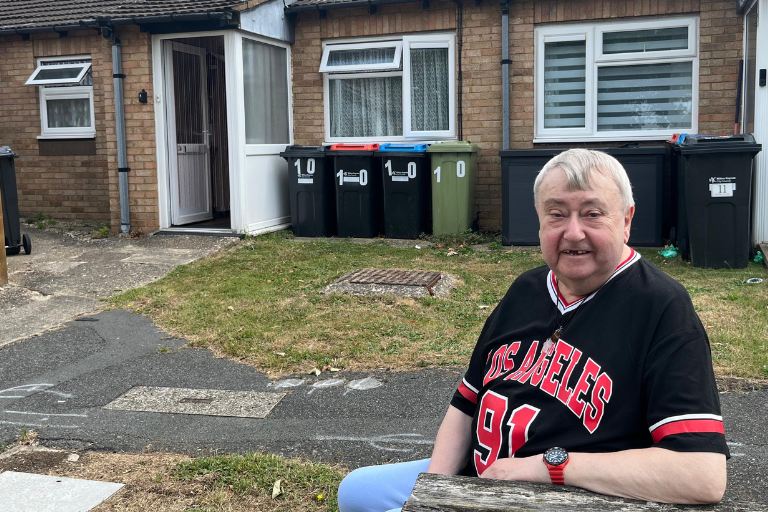
Milton Keynes City Council has found new homes for 46 households previously living in the 1960s-built REEMA blocks in Bletchley as part of a major programme to improve housing quality and plan for the future of these sites.
In late 2023, the city council announced that it would be taking a phased approach to finding new homes for REEMA blocks tenants. The four blocks Argyll, Stirling, Edinburgh and Sawley House are now vacant, with tenants having moved into new council homes. This marks the successful completion of phase 1, with phase 2 now underway. It is expected that all REEMA blocks will be empty by the end of 2028.
Each tenant has been supported by a dedicated council colleague who has worked closely with them, meeting them individually to understand their needs and helping them move into a home that better suits their needs.
Council colleagues recently visited Barry (pictured above), one of the tenants who has been rehoused in a bungalow to remove the challenge of having to deal with stairs.
The city council is now preparing for the future of the sites and is looking to begin the search for a contractor to carry out the demolition of the empty buildings. This will allow options to be explored about what can replace them, the funding available and enable conversations to take place with the local community.
A decision to begin the procurement search for a demolition contractor is set for next week.
“We’re pleased to have supported our tenants into new homes and we’ll continue working with residents in the remaining two phases. This goes beyond just moving people – it’s about giving families somewhere decent to live and a fresh start. With Phase 1 complete, we can also start looking ahead and begin shaping the future of these sites, which includes looking for ways to secure funding and build new council homes.”
In previous years, detailed assessments have been carried out by industry experts, which revealed that the blocks built more than 50 years ago were done so using a method where chemicals were added to concrete. While the flats are safe to live in, buildings constructed this way become more susceptible to the weather over time, and the surface of the concrete can become loose. Following the assessments, it was clear that the type and cost of repairs required to keep these old buildings to an expected standard would become unmanageable.
Fencing remains around some areas of the blocks to protect residents from loose concrete. Scaffolding is also in place to allow ongoing monitoring and any surface repairs needed.
This challenge is not unique to Milton Keynes, with councils across the country dealing with similar issues, such as in Leeds, where two 10-storey blocks are being decommissioned.
